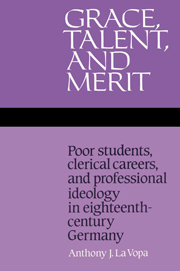 Grace, Talent, and Merit
Grace, Talent, and Merit Book contents
- Frontmatter
- Contents
- Acknowledgments
- Introduction
- PART I POOR STUDENTS
- PART II CALLING, VOCATION, AND SERVICE
- 5 The calling: August Hermann Francke and Halle Pietism
- 6 Vocation: the natural self and the ethic of reason
- 7 Meritocracy: language and ideology
- 8 The egalitarian alternative: theory and practice
- PART III NEW DEPARTURES
- Epilogue
- Bibliographical note
- Index
7 - Meritocracy: language and ideology
Published online by Cambridge University Press: 26 March 2010
- Frontmatter
- Contents
- Acknowledgments
- Introduction
- PART I POOR STUDENTS
- PART II CALLING, VOCATION, AND SERVICE
- 5 The calling: August Hermann Francke and Halle Pietism
- 6 Vocation: the natural self and the ethic of reason
- 7 Meritocracy: language and ideology
- 8 The egalitarian alternative: theory and practice
- PART III NEW DEPARTURES
- Epilogue
- Bibliographical note
- Index
Summary
THE LOGIC OF NEOCORPORATISM
At the beginning of Emile, Rousseau explains why “the chief thing” in his pedagogical strategy is “to prevent anything from being done”:
In the social order where each has his own place a man must be educated for it. If such a one leave his own station he is fit for nothing else. His education is only useful when fate agrees with his parents' choice. … where social grades remain fixed, but the men who form them are constantly changing, no one knows whether he is not harming his son by educating him for his own class.
In the natural order men are all equal and their common calling is that of manhood, so that a well-educated man cannot fail to do well in that calling and those related to it. It matters little to me whether my pupil is intended for the army, the church, or the law. Before his parents chose a calling for him nature called him to be a man. Life is the trade I would teach him …. In vain will fate change his station, he will always be in his right place.
It was only as an import, domesticated for native consumption, that Emile found a broad audience among German educational reformers. Its German domestication in the last third of the century confirmed the pertinence of Rousseau's distinction between the human being (Mensch) and the “citizen” (Bürger), but reversed his priorities. This was in part because the rationalist preoccupation with “duty” in the German Enlightenment implied a radically different relationship between the natural self and society.
- Type
- Chapter
- Information
- Grace, Talent, and MeritPoor Students, Clerical Careers, and Professional Ideology in Eighteenth-Century Germany, pp. 197 - 215Publisher: Cambridge University PressPrint publication year: 1988
